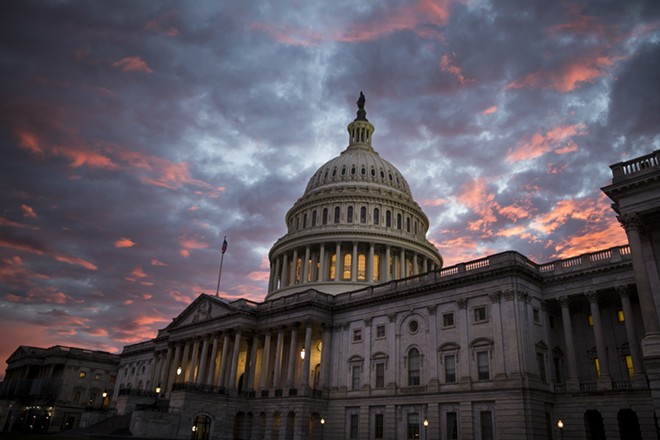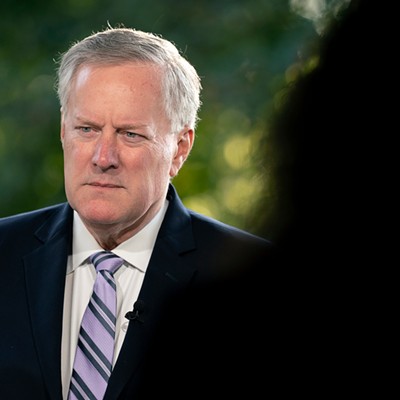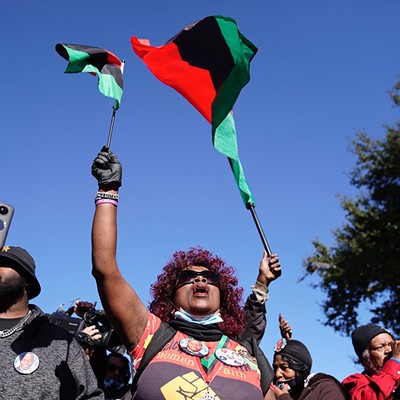More aid to states? That may depend on their political hue
[
{
"name": "Broadstreet - Instory",
"insertPoint": "5",
"component": "25846487",
"requiredCountToDisplay": "5"
},{
"name": "Broadstreet - Instory",
"insertPoint": "10",
"component": "25846487",
"requiredCountToDisplay": "10"
},{
"name": "Broadstreet - Instory",
"insertPoint": "15",
"component": "25846487",
"requiredCountToDisplay": "15"
},{
"name": "Broadstreet - Instory",
"insertPoint": "20",
"component": "25846487",
"requiredCountToDisplay": "20"
}
]
By Emily Cochrane
The New York Times Company
WASHINGTON — When Sen. Mitt Romney of Utah strode into a luncheon with fellow Republicans last week, he was carrying an oversize poster in his black-gloved hand that bore a blunt message: “Blue states aren’t the only ones who are screwed.”
Two days later, Sen. Rick Scott of Florida made the opposite point, arriving at another party gathering with his own placard that showed how rosy his state’s financial picture was compared with those of three Democratic states: New York, Illinois and California. Why should Congress help struggling states and cities, he argued, when the bulk of the aid would go to Democratic strongholds that he said had a history of fiscal mismanagement?
The two Republican senators illustrate the contentious debate within their party that is shaping the next sweeping package of federal coronavirus relief. With many states and cities experiencing devastating fiscal crises amid the pandemic, Democrats in Congress have joined governors and mayors in pressing for a huge infusion of money for troubled states, cities and towns.
On Monday, the Democratic governors of five Western states — California, Colorado, Oregon, Nevada and Washington state — said that all 50 states would need $1 trillion in “direct and flexible relief.”
President Donald Trump has not ruled out sending additional money to states. But he has gone after Democratic governors, accusing them of mismanaging their finances.
States are suffering from a collapse in sales and other tax revenue, even as they face enormous new costs for health care, emergency medical services, jobless aid and other safety net programs. Without more support, the Western governors warned, states would have to make “impossible decisions” such as whether to fund public health care programs or lay off teachers, police officers, emergency medical workers and firefighters.
Republicans are divided over whether to help at all and how much aid to provide, as well as what conditions to place on the money. Much of the dispute — unfolding just months before the November elections in which control of the Senate is at stake — is being driven by the political bent of the states that stand to benefit or lose.
The New York Times Company
WASHINGTON — When Sen. Mitt Romney of Utah strode into a luncheon with fellow Republicans last week, he was carrying an oversize poster in his black-gloved hand that bore a blunt message: “Blue states aren’t the only ones who are screwed.”
Two days later, Sen. Rick Scott of Florida made the opposite point, arriving at another party gathering with his own placard that showed how rosy his state’s financial picture was compared with those of three Democratic states: New York, Illinois and California. Why should Congress help struggling states and cities, he argued, when the bulk of the aid would go to Democratic strongholds that he said had a history of fiscal mismanagement?
The two Republican senators illustrate the contentious debate within their party that is shaping the next sweeping package of federal coronavirus relief. With many states and cities experiencing devastating fiscal crises amid the pandemic, Democrats in Congress have joined governors and mayors in pressing for a huge infusion of money for troubled states, cities and towns.
On Monday, the Democratic governors of five Western states — California, Colorado, Oregon, Nevada and Washington state — said that all 50 states would need $1 trillion in “direct and flexible relief.”
President Donald Trump has not ruled out sending additional money to states. But he has gone after Democratic governors, accusing them of mismanaging their finances.
States are suffering from a collapse in sales and other tax revenue, even as they face enormous new costs for health care, emergency medical services, jobless aid and other safety net programs. Without more support, the Western governors warned, states would have to make “impossible decisions” such as whether to fund public health care programs or lay off teachers, police officers, emergency medical workers and firefighters.
Republicans are divided over whether to help at all and how much aid to provide, as well as what conditions to place on the money. Much of the dispute — unfolding just months before the November elections in which control of the Senate is at stake — is being driven by the political bent of the states that stand to benefit or lose.
















